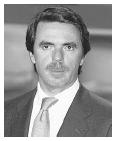SPAIN
José María Aznar
Prime Minister

(pronounced "ho-ZEY mah-REE-ah AZ-nar")
"Spaniards have been very generous to us and we know how to thank them: with hard work and collaboration."
The Kingdom of Spain occupies four-fifths of the Iberian peninsula in Southwestern Europe. The national territory also includes the Balearic Islands in the Mediterranean Sea, the Canary Islands in the Atlantic Ocean, and a few small enclaves in Morocco. Together, these parts cover 504,782 sq km (194,896 sq mi). Mainland Spain shares its northern border with France and its western border with Portugal. The Mediterranean Sea lies to the east. Morocco is 30 km (20 mi) to the south. The capital and largest city is Madrid; metropolitan Madrid is home to 4 million Spaniards. The nation's population was estimated at 40 million in 2002, and was reportedly largely Roman Catholic, although there has been no state religion since 1979. Castilian Spanish is the official language, but the distinct ethnic groups within Spain— Catalans, Valencians, Gallegos, and Basques—have preserved their languages. Regional divisions within Spain have led to the formation of 19 autonomous regions within the country, each with its own political parties and government.
Spain's economy is one of the largest of the Organization for Economic Cooperation and Development (OECD) nations. Its gross domestic product (GDP) was expected to account for 8% of the combined GDP of the "euro-zone" countries that adopted the new euro currency in January 1999. The country's GDP was estimated at US $828 billion in 2002, with per capita GDP estimated at US $20,700. As a member of the European Union (EU), Spain has tied its economy closely to the regulations that govern that alliance. Almost 75% of trade—both imports and exports—is carried on with other EU nations. Principal exports include automobiles, fruit, minerals, metals, clothing and textiles. Imports include petroleum, aircraft, grains, chemicals, machinery, and transportation equipment. Until 2002, the currency was the peseta; that year, Spain was among the nations to adopt the common currency, the euro. Unemployment decreased from over 24% (1996) to 11.3% (2002). In 2003, the country's economy was expected to grow by 3% (government estimate), compared with 1.0% to 1.2% for the EU.
ADDRESS
Office of the Prime Minister
Complejo de la Moncloa
Edif. INIA
28071 Madrid, Spain